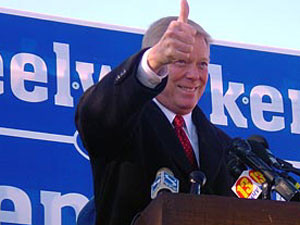Photos
More from MPR
Your Voice
| |||||||||||||||||||||||||||||||||
Gephardt quits presidential race
January 20, 2004
St. Louis, Mo. — (AP) Dick Gephardt, the former House Democratic leader and 14-term congressman, said Tuesday he was abandoning his second bid for the presidency after a poor, fourth-place showing in the Iowa caucuses.
"I gave this campaign everything I had in me," Gephardt told a news conference, his voice breaking at times. "Today my pursuit of the presidency has reached its end. I'm withdrawing as a candidate and returning to private life after a long time in the warm light of public service."
Gephardt said he would serve out his final year in Congress and would continue to work on behalf of universal health care coverage, pension reform, energy independence and a trade policy that "doesn't sacrifice American jobs."
His decision left seven candidates vying for the Democratic nomination.
In 1988, Gephardt won Iowa in his first unsuccessful bid for the Democratic nomination. On Monday, despite a strong field organization and union endorsements, Gephardt finished fourth in Iowa, behind John Kerry, John Edwards and Howard Dean.
Backed by almost two dozen labor unions, Gephardt went into Iowa with high expectations, but labor turnout was down. In 2000, a third of the voters were from union households. This year, fewer than one-fourth of caucus-goers were from labor, according to entrance polls conducted for The Associated Press and the television networks by Edison Media Research and Mitofsky International.
And while Gephardt did better among union households than among most other groups, Kerry had a slight edge, and Edwards and Dean did as well as Gephardt among the labor vote, according to the interviews of 1,665 people entering 50 randomly selected Democratic caucus sites. Results were subject to sampling error of plus or minus 4 percentage points.
Gephardt's poor performance in Iowa was expected to create new interest among the Democratic presidential rivals in Missouri's Feb. 3 presidential primary, where the winner could capture 74 pledged delegates.
Gephardt remains on the ballot - the deadline for withdrawal was Dec. 23 - and Missouri Gov. Bob Holden told The Associated Press in a telephone interview that he and other Gephardt followers were waiting to see which of the other candidates Gephardt prefers, if any.
"I don't know if he's going to encourage people to vote for someone else or stay with him," Holden said. "Dick has got to take his 30 years of public service and decide how he's going to proceed."
Gephardt and Dean had the strongest organizations to turn out supporters - traditionally the key in the complicated caucus system. But Kerry and Edwards had the momentum in the race's final week, finishing first and second respectively.
"Never give up. Never give in. Never stop helping your country be an even better place," he told supporters Monday night.
His return to St. Louis pointed to the end of a career that took Gephardt to the heights of Democratic politics - but left him without either of the two positions he sought, the presidency and speaker of the House.
As Democratic majority leader in the House in 1994, he became the head of a shocked minority after a Republican landslide gave the GOP control. He spent the next six years attempting to win back the majority, falling short each time.
He stepped down as Democratic leader after the 2002 midterm elections, in which Republicans gained seats.
Gephardt was a pragmatic politician who campaigned as a man with working-class roots. On the stump, he nearly always mentioned his father, a Teamster milk truck driver, and his mother, a secretary - neither of whom finished high school.
And while he was an experienced political figure that many voters saw as a creature of Washington and Capitol Hill, he argued that he was man with new ideas for running the country.
He campaigned aggressively as an opponent of NAFTA and the China trade deal, arguing that they were responsible for thousands of job losses, often to overseas sweatshops that employed child labor.
He also campaigned to repeal President Bush's tax cuts and use the money to help extend health care to all Americans. It was a personal, as well as a political issue for him. He called his proposal "Matt's plan" after his son, who was diagnosed with cancer as a toddler but survived.
"This didn't come out the way we wanted," Gephardt said after the caucus results were tallied. "But I've been through tougher fights in my life. When I watched my 2-year old son fight terminal cancer and win, it puts everything into perspective."
|
News Headlines
|
Related Subjects
|


